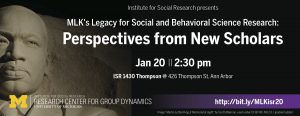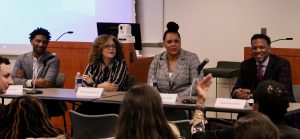MLK’s Legacy for Social and Behavioral Science: Perspectives from New Scholars
February 27, 2020

Ann Arbor – As part of the University of Michigan’s Rev. Dr. Martin Luther King Jr. Symposium, the Institute for Social Research hosted a panel of scholars who explored MLK’s legacy for social and behavioral science. David C. Wilson, political psychologist, and moderator of the event, tasked the interdisciplinary group of scholars with honoring MLK by sharing more than just their findings. He challenged them to tell the audience about their journeys, both personal and professional, discuss how their experiences and perspectives have shaped their research, and share their hopes and dreams for the future.
DeAnnah Byrd: My path to examining cognitive health in Blacks
Deannah Byrd’s interest in health disparities and inequalities emerged during her medical studies at the University of Wisconsin. Byrd watched as her boss, an infectious disease specialist, worked directly with a public health epidemiologist to roll out important safety and health protocols during the SARS outbreak in 2003. Byrd remembers that, “It was at this moment that I realized I no longer wanted to study medicine. I wanted to have a much broader focus than an individual patient… I wanted to have a public health impact.”
Byrd then began to study health disparities across the lifespan, examining health outcomes in Black Americans from infancy to young adulthood, to old age. The research on health disparities among Black Americans is well-established; Byrd was interested in finding out at which age those disparities emerge. It turns out that it’s happening much earlier than previously thought. Byrd’s research shows that significant gaps emerge at age 45 and only widen from there.
“By the year 2030, 1 in 5 adults will be 65 or older and minority count will nearly double in size. What are these people’s needs? And how can we focus interventions on them?”
Now a postdoctoral scholar in the Institute of Gerontology at Wayne State University, Byrd’s current research seeks to reduce cognitive health burdens in older Black Americans. In order to eliminate these disparities altogether, Byrd insists on racial equity in funding, support, tenure, and promotion of Black scholars. In her message to students, Byrd encouraged them to stay the course, “Great orators, like MLK, take a lot of time on their work, and so should you.”
Watch DeAnnah Byrd’s full talk
Taylor Hargrove: Multidimensional Inequalities in Health
Taylor Hargrove grew up in Baltimore, Maryland where she saw two sides of the city– visits to the beautiful Harbor contrasted with the dilapidated homes and liquor stores on the way to her grandmother’s house. Hargrove eventually understood that these disparities culminated in severe health consequences for the city’s population and that this was happening all over the country.
In graduate school, Hargrove wanted to better understand these social determinants of health and began looking at how power and structure can shape an individual’s well-being and quality of life throughout the lifecourse. Currently an assistant professor of sociology at the University of North Carolina at Chapel Hill, Hargrove focuses on identifying “residual race gaps” in health, which are the unexplained gaps in health that can not be accounted for by socioeconomic status or other behavioral factors.
“Most of our studies examining racial inequality have been comparative, comparing one minority group to whites,” Hargrove said, “this approach assumes that both groups are being impacted by social factors in the same way.” Hargrove believes this assumption is weak. To understand how we can address these gaps Hargrove applies an intersectional approach to her research, focusing on how individuals within a group (e.g. Blacks) are impacted by an array of social factors. Hargrove’s current research explores the extent to which race, skin color, gender and social class combine to shape health at different stages of life.
“If blacks had the health of whites in the U.S., over 880,000 deaths could have been avoided.”
In illuminating the role that social factors play in health outcomes, Hargrove hopes to eliminate suffering and avoid excess deaths among marginalized groups. Hargrove sees this work as an extension of MLK’s dream that people be judged on the content of their character, not by the color of their skin. Because, as Hargrove’s work shows, those judgements and biases have proven to be toxic and deadly.
Watch Taylor Hargrove’s full talk
Lloyd Talley: Unpacking risk and resilience among urban Black emerging adult men
Lloyd Talley, a postdoctoral fellow in the University of Michigan School of Social Work, has been acutely aware of the ways in which his development has differed from some of his peers from an early age. “I’m from New York, so I’ve been studying Black manhood since I was a child,” Talley said. But, it was in college, at Howard University, where Talley realized the scope of diversity among Black men. Then, as many in D.C. are wont to do, Talley took a political approach to learn about and fix real world disparities, lobbying government agencies and working on political campaigns. Talley was drawn to the impact-driven work of policy makers and organizations focused on interventions, particularly for Black men, but soon realized that most of the decision-makers didn’t understand the population they were trying to serve, and furthermore, neither did he.
Talley returned to school and began examining what he calls the “precarious emergence” of Black men. This is a stage (18-30 years old) where Black men are most at risk for things like incarceration, death, unemployment and other major disadvantages. Talley is interested in identifying the reasons that these disadvantages accrue so significantly with Black men at this age.
“Tons of money is being thrown into the philanthropic space to support boys and young men of color, but when we look at the literature, there are still significant research gaps.”
Talley’s research on the intersectional identities of Black men aims to help fill some of those gaps. Ultimately, Talley hopes that this research can inform the development of targeted interventions to support the well-being of Black men and create a blueprint for resilience in Black manhood.
Watch Lloyd Talley’s full talk

Panel answering questions, (left to right): Lloyd Talley, Taylor Hargrove, DeAnnah Byrd, David C. Wilson
Thanks to the Research Center for Group Dynamics and the Program for Research on Black Americans for organizing the event and to all of the participants for their time and participation in this year’s event.
More:
Full video of event: https://www.youtube.com/watch?v=ZRTDfArzBCs&feature=youtu.be
Photos from the event: https://flic.kr/s/aHsmLEa64v
Contact:
Catherine Allen-West [email protected]
